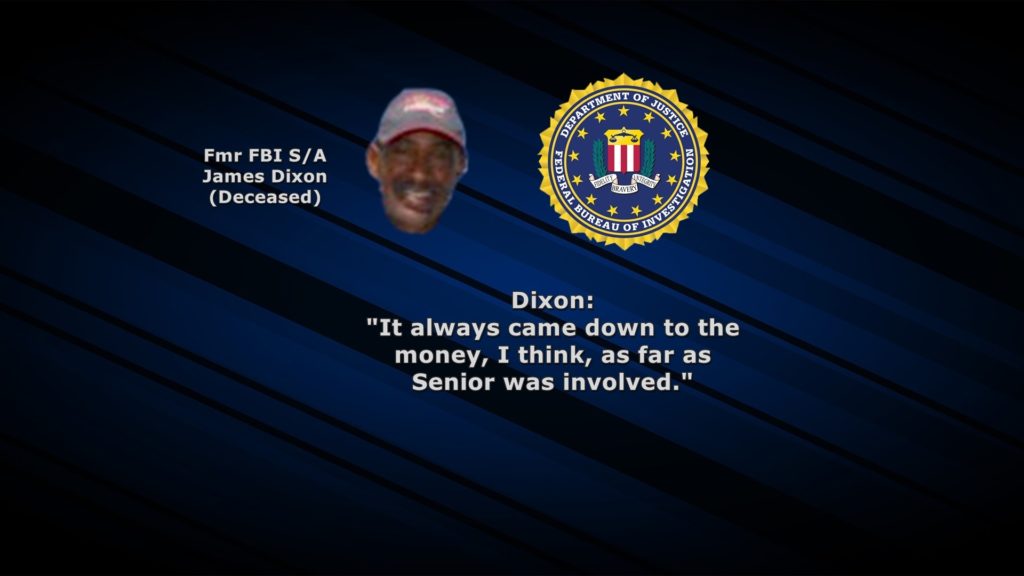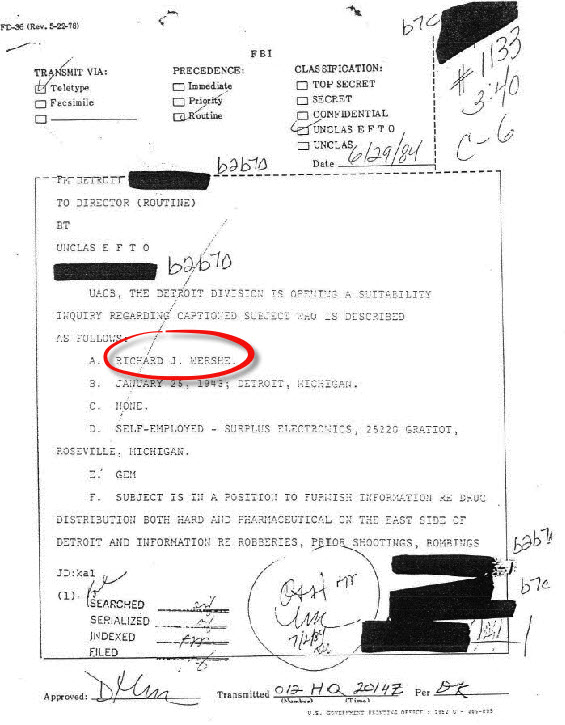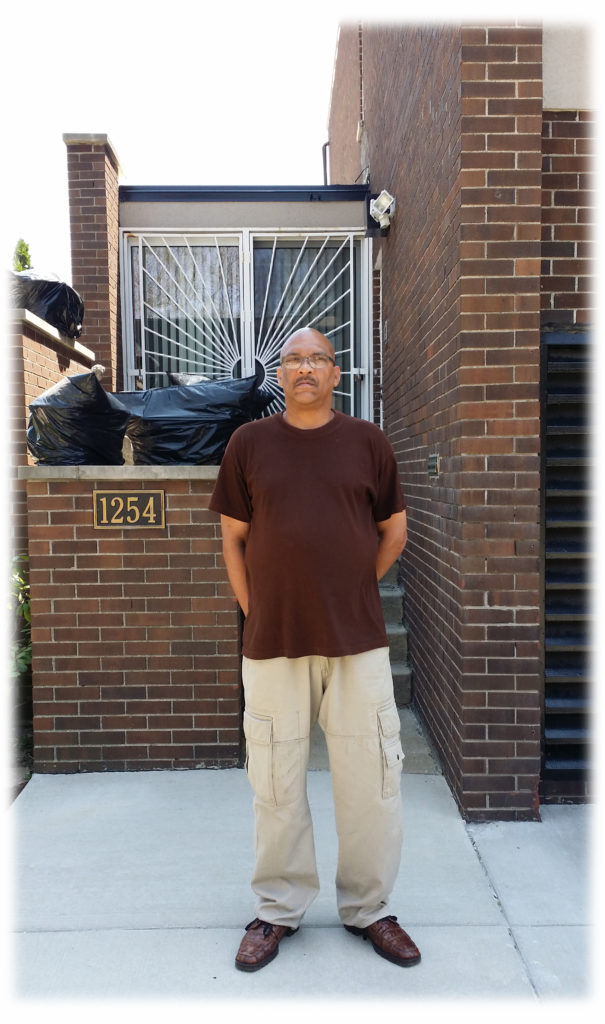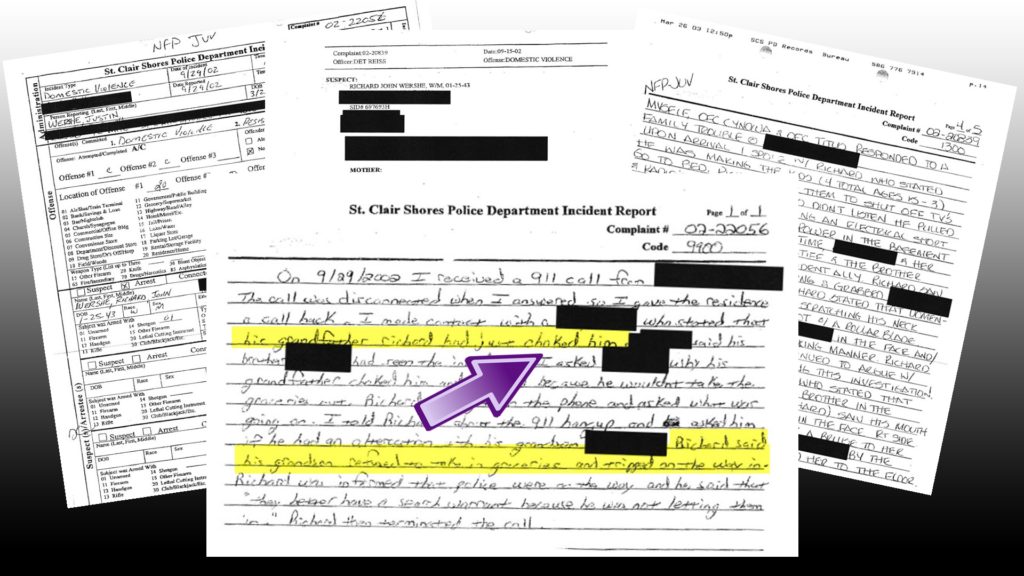A True Prisoner of War
Richard John Wershe, Jr.—known to the public as White Boy Rick—has filed a $100 million-dollar lawsuit against the Detroit Police and FBI for what he’s calling law enforcement child abuse. What he means is, it was abusive for the FBI and Detroit police to recruit and use him as an underage drug informant in the mid-1980s.
What happened to Wershe is a miscarriage of justice of epic proportions. The truth is appalling. But Wershe’s lawsuit contains some things that are, shall we say, less than the truth

It contains misstatements of facts and self-serving revisionist history closer to the Hollywood version of his life instead of his real life.
The top of the first page is in error because one of the named defendants is deceased. James Dixon, an FBI special agent, passed away in 2018.
So-called due diligence, would have avoided this blunder.
To describe James Dixon’s role, it’s necessary to describe how Rick Wershe became a paid FBI snitch.
In the 1980s when the FBI started working drug investigations, William Don Tisaby, a Detroit black agent, was sent undercover to gather intelligence from Detroit’s nighttime bar scene. It was where the dope dealers hung out. Tisaby zeroed in on the Currys because they reputedly had political connections. Tisaby found out there was a young white kid hanging out with them. He passed the intel to the FBI’s new drug squad.
At about this time, Richard Wershe Sr. called the Detroit FBI for help with his drug-addicted daughter, Dawn. He knew some FBI agents because he worked for a time at a local gun shop.
Paid Recruit
How Rick Wershe, Jr. was recruited as a paid FBI drug informant is a key point where the lawsuit misstates the facts and the truth. The lawsuit says he met Special Agent Dixon with his father at a McDonald’s restaurant, where Wershe Senior wanted ask for help with his addicted-daughter.
This is not what happened.
Rick didn’t first meet FBI agents in a chance meeting at a fast-food joint. Rick’s first encounter with the FBI was at his own residence. This was confirmed by Dixon, by his father, Richard Wershe Sr. and by Rick himself in his testimony before the Michigan Parole Board.

In September, 2014, a now-defunct magazine called the Atavist did the first serious story about young Rick Wershe called The Trials of White Boy Rick.
Evan Hughes reported that Richard Wershe, Sr. told him a team of FBI agents came to the Wershe residence with surveillance photos and asked for help identifying the individuals in the pix. Wershe Senior didn’t know who they were but Wershe Junior did, and that launched the kid’s career as a paid FBI informant.

I wrote a book about the Rick Wershe story as part of the larger saga about the failed War on Drugs. Prisoner of War: The story of White Boy Rick and the War on Drugs is based on a lot of research and a lot of interviews. I interviewed Rick Wershe extensively through letters and by telephone.
Rick must’ve forgotten: he told me the same story from prison about his FBI recruitment that his now-deceased father told the Atavist.
It was the same story I heard from the late Jim Dixon, the FBI agent who recruited Rick along with another FBI agent, Al Finch.
I interviewed Dixon in person before he passed away. We will hear what Dixon has to say in a moment. But Rick has another problem with his revisionist tale of his FBI recruitment.
Changing His Story
The story in his lawsuit is NOT what he told the Michigan Parole Board, under oath in 2017.
At his parole hearing Rick Wershe testified:
“They came to our house the first time and they had photos.
And they asked my dad who was this, who was this, and my dad told them, ‘I don’t know’…I was upstairs.
And one of the agents told my dad, ‘Well, your son knows.’”
Assistant State Attorney General Scott Rothermel asked Wershe: “So does your dad call you down?”
Wershe: “Yes sir.”
Rothermel: “Okay. So he calls you down and what happens next?”
Wershe: “I looked at some of the photos and I told them who they were.”
Rick Wershe’s lawsuit portrays him as a frightened child doing what the FBI and Detroit Police ordered him to do.
Jim Dixon, the late FBI agent, says it wasn’t like that at all. I interviewed Dixon in a coffee shop and his voice was clear over the background noise.

Dixon:
“He always was eager to talk, you know? Especially after they started getting money, he would come in with all kinds of information. You know. And he would do, like I said, most of the talking at those meetings. And he seemed very creditable (sic) when I talked to him. When we talked to him.
His dad was pushing him to provide that information.”
Q: “His dad was what?”
“Pushing him, you know. His dad was…”
Q: “Information?”
“Yeah. To get information, you know…”
Q: “For the money?”
“Yeah. For the money. His Dad was interested in the money.”
The FBI was willing to pay cash for information about the Curry drug gang. And they did.
Rick Wershe didn’t mention to the parole board that he was a frightened kid intimidated by the FBI and the police. Rick thought working secretly for law enforcement was cool. And Rick was interested in the money, too. Very interested. That’s what he told the Michigan Parole Board in 2017:
Wershe: “…to be honest with you in the beginning I was a kid. I thought it was cool. I was working for the police.”
Rothermel: “Is that what drew you to this or drew you and kept you in at the beginning?”
Wershe: “That and the money.”

Dixon:
“It always came down to the money, I think, as far as Senior was involved. He was more interested in the money. I don’t think he was looking at the safety of his son or anything like that. You know? We didn’t push it and I guess that’s because we wanted information, so… (chuckles)”

The FBI’s dirty secret about the informant known as Richard J. Wershe, was that the Wershe listed in the FBI files as a paid drug informant, wasn’t the real snitch. It was his son, Richard J. Wershe, Jr.
The FBI used the Junior/Senior same-name coincidence as cover for using a teen-aged informant. In truth, Richard Wershe Senior knew nothing about the Detroit drug scene.
Dixon:
“Whatever information he had it was provided by his son. I mean, he might, he might say something but he would indicate that, you know, Junior told him this, or something like that. Yeah. No. He really didn’t have any information.”
Many news outlets, including the Washington Post, reported on Wershe’s lawsuit. The Post reporter led his story with Rick’s tale of a kid being recruited to be an FBI drug snitch in a McDonald’s restaurant.
Regarding that disputed McDonald’s restaurant encounter, Dixon says there was a meeting at a McDonald’s on the west side, but it was almost a year after Rick Wershe’s recruitment as an informant. It was the location of the introduction of fellow agent Herman Groman to the Wershes, because the case had been re-assigned from Dixon to Groman.
Retired agent Groman told me when he first saw Rick Wershe, he thought he was meeting the 1950s kids’ show puppet, Howdy Doody.

“Herm and I walked in and they were already there. In a booth. and I introduced them at that time,” Dixon said.
The lawsuit tries to portray Rick Wershe as some kind of innocent who knew about the Curry Brothers through neighborhood gossip. That’s not what Rick Wershe told the Michigan Parole Board.
In a discussion of the Curry drug gang, Rick Wershe testified at his parole hearing that he got to know all of the Curry Brothers by playing basketball at the neighborhood recreation center with Rudell Curry, the youngest of the brothers.
Wershe: “Rudell Curry (the youngest Curry brother), I had become pretty good friends with.”
Rothermel, referring to the Curry Brothers, asked: “And you know who they were and what they did, right?”
Wershe: “Absolutely.”
Did Rick Wershe lie in his lawsuit? Or did he lie to the Michigan Parole Board in 2017?
Rick Wershe’s lawsuit contains other untruths and questionable assertions. For example, the lawsuit describes an episode where hitmen attempted to kill White Boy Rick while he was a passenger in a car at a traffic light. The suit identifies the driver as a friend of Wershe, first name Roy, last name unknown.

Roy is Roy Grisson, a fringe member of the Curry gang who was one of Rick Wershe’s good friends.
I took a picture of Grisson standing in front of a condo Rick shared for a time with Kathy Volsan, then-Mayor Coleman Young’s niece. I found Grisson with Wershe’s help from prison. Yet now, he asserts he doesn’t remember Roy’s last name.
Finally, in announcing his lawsuit, Rick Wershe complained bitterly about media misstatements and lies about his late father.

The Truth Is Uglier Than Fiction
He may be confusing his deceased real father with the version portrayed by Matthew McConaughey in the movie, White Boy Rick.
The real Richard Wershe Senior was willing to put his son in danger for FBI cash.
The real Richard Wershe Senior was a domestic abuser who once threw his wife out of the house and locked her out in the snow while she was barefoot and in a nightie. The Wershes divorced largely due to domestic violence.

There are numerous domestic violence arrests and convictions of Richard Wershe Senior in the archives of the police in Roseville and St. Clair Shores. In one incident he was arrested for choking his grandson because the kid didn’t bring groceries from the car into the house.
Apparently, Rick has forgotten he moved out of his father’s house and lived with his mother for a year because he couldn’t take his father’s abuse.
A famous writer named Virginia Woolf said, “If you do not tell the truth about yourself, you cannot tell it about other people.” Rick Wershe’s lawsuit shows he hasn’t learned that lesson.

Fact of the matter is that the FBI used and manipulated a young teenage boy.. they r considered the law and are suppose to have a better morale than a civilian so it’s said .. but yet u sit here and criticize this man and defend a group of individuals who have no care in the world of others safety as long as they get there man.. shame on u…this is the problem with the world land of the free and the brave I think not what are we free to do besides be there any moment you could be shot by a cop put in jail for something you didn’t do get manipulated by officer of the law to snitch or get involved in situations that aren’t your business and without a care in the world of your safety or the safety of your family for your door can get kicked in because they have the wrong house on a search warrant you get shot and it’s okay because they were in the perimeters of the law .. and brave whose Brave the Americans are brave every time they go out their door every time they open their door every time they go to bed yeah that’s what’s Brave never know when the cop might come in and kill you and your family get it together before God comes and gets it together for all of us…